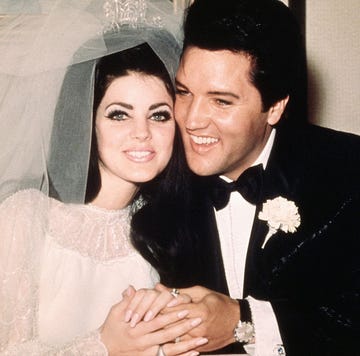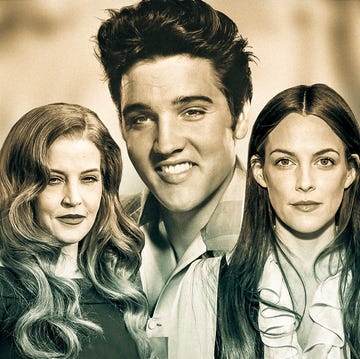Now a century old, the Grand Ole Opry has played host to some of the biggest names in country music—Dolly Parton, Loretta Lynn, and Randy Travis just to name a few. In 1954, a promising 19-year-old named Elvis Presley hoped to leave his mark on the iconic program.
Instead, he bombed.
Although his commanding stage presence would later solidify his legacy as the “King of Rock ’n’ Roll,” Elvis failed to win over the audience and Opry executives during his lone appearance on the show. By his own account, it was so disappointing that he was advised to give up music entirely.
That anecdote remains disputed, but the gig clearly wasn’t the catalyst Elvis hoped for at the outset of his career.
Elvis was just starting out when he got the Opry gig
After graduating from Humes High School in Memphis, Tennessee, in 1953, the teenaged Presley had to juggle his music aspirations with his new responsibilities as a working adult. That summer, he had taken a job at Parker Machinists Shop.
Presley recorded his first demos as a birthday gift for his mother, Gladys. According to Graceland, these tracks caught the attention of DJ and producer Sam Phillips, who soon tried to capitalize on Presley’s talent.
By spring 1954, Presley was working as a delivery driver for Crown Electric Company when Phillips invited him to record at Sun Studio with local guitarist Scotty Moore and bassist Bill Black. The trio released their first single, with the B side featuring a cover of bluegrass pioneer Bill Monroe’s “Blue Moon of Kentucky.”
Presley and his new band began to play small shows throughout the South and slowly built an audience. Phillips hoped an appearance at the Grand Ole Opry would accelerate their stardom, so he reached out to manager Jim Denny to book a slot.
The Opry host forgot Presley’s name
Presley, Moore, and Black arrived at the Ryman Auditorium, the famed one-time home of the Opry, on October 2, 1954, and prepared for their brief appearance. The trio were allotted only one song during the 10:15 p.m. segment hosted by Hank Snow.
Perhaps a foreboding omen, Snow forgot Presley’s name as he took the stage and simply introduced him as “a young man from Memphis.”
Undeterred, Presley and his musicians launched into “Blue Moon of Kentucky.” However, the group leaned into its “rockabilly” performing style, delivering a rhythm-heavy rendition of the song that caught the audience—familiar with Monroe’s country version—by surprise. “The crowd was polite. They didn’t roll in the aisles or anything like that because this was something new to them,” Moore recalled.
Other accounts also suggest a tepid-at-best response from those in attendance. However, what happened backstage between Presley and Denny is still the subject of debate.
Elvis says he was told to keep driving trucks
In Presley’s telling, Denny didn’t see a bright future for the young musician following his appearance. The singer remembers the Opry manager advising him to “go back to Memphis and drive a truck.”
Moore has corroborated this rather harsh narrative. “Now the story that everybody’s heard so much of about Bill Denny saying to Elvis, ‘You oughta keep your truck driving job,’ or something like that, I don’t know because I wasn’t there. But [Elvis] told me about it, told me and Bill about it after it was said,” Moore explained, adding the comment hurt Presley’s feelings.
But while he probably didn’t think Presley was a fit for the Opry, Denny has disputed the frankness of his comments and reportedly told Phillips: “This boy’s not bad.”
Whether the performance was as poorly received as Presley suggested, it certainly fueled his determination. Per Elvis’ Graceland biography, he, Moore, and Black all ignored Denny’s alleged advice and quit their day jobs later that month to continue recording and traveling. The move paid off, as Phillips soon booked another gig that changed the course of Presley’s career.
He became a regular on the Louisiana Hayride
Two weeks after the Opry performance, on October 16, Presley made his debut on the Louisiana Hayride, a rival radio show based in Shreveport. The three-hour Hayride program had started six years prior and became known as the “Cradle of the Stars” after helping launch the careers of Hank Williams, Johnny Cash, George Jones, and others. The show aired throughout the South and portions even made the cut for CBS Radio’s national broadcast.
After his first appearance went well, Presley began appearing as a regular three weeks later for $18 per show. Because he was only 19 at the time, his parents had to sign his contract. Presley became so popular, the agreement was renewed the following year at a much more lucrative rate of $200 for each appearance.
But as we all know, Elvis outgrew regional radio. The release of his self-titled debut album in March 1956 was the catalyst for a national tour as well as his famous appearance on The Ed Sullivan Show that September. Elvis’ new manager, Colonel Tom Parker, bought out his Hayride contract for $10,000, with the stipulation that the singer appear at a charity concert held just before Christmas.
Over the next few years, Elvis became a bona fide music and movie star, served in the U.S. military, and met his future wife, Priscilla Beaulieu—making the Opry performance nothing more than an unusual footnote. However, it still remains an intriguing snapshot from his illustrious career.
Tyler Piccotti joined the Biography.com staff as an Associate News Editor and is now the News and Culture Editor. He previously worked as a reporter and copy editor for a daily newspaper recognized by the Associated Press Sports Editors. In his current role, he shares the true stories behind your favorite movies and TV shows and profiles rising musicians, actors, and athletes. When he's not working, you can find him at the nearest amusement park or movie theater and cheering on his favorite teams.














